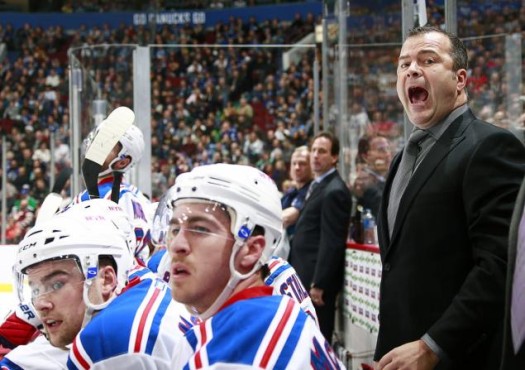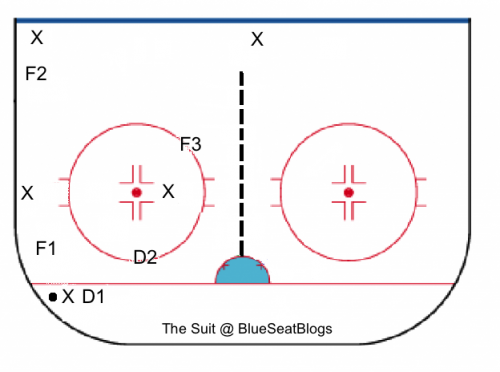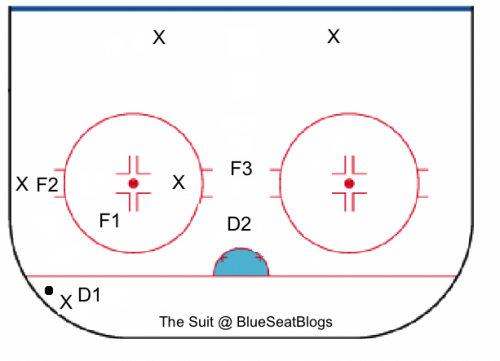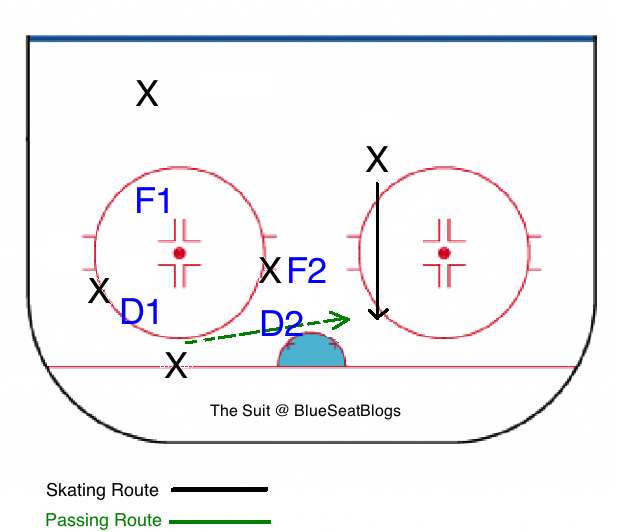The second round matchup is now set, as the Rangers will take on the Ottawa Senators in the Atlantic Division Final. The Sens closed out the Bruins in overtime last night, setting the stage for Game One in Ottawa this week. The Senators are going to pose a problem for the Rangers, as they have some pretty solid team speed and skill.
The last time these two teams faced off in the playoffs was in 2012, with the Rangers winning in seven games. Both teams are completely different now, so there isn’t much to go on from that series. While the Senators certainly do not have the forward depth to match the Blueshirts, they have a good amount of speed and skill throughout the lineup. Erik Karlsson looms large as well. They play very well and are a disciplined team under Guy Boucher.
Forechecking
Even strength play for the Rangers revolves around creating high chance opportunities off the rush with a steady forecheck and set breakouts. Last year this was an issue, as team speed wasn’t on par with the style of play they wanted. However this year is different. The reloaded forwards are capable of springing a rush off a turnover very quickly. Couple that with improved skill and finishing ability, and the Rangers have one of the more potent offenses in the league.
The forecheck is an area where the Rangers need to commit. They are still an effective forechecking team, but are also prone to lapses. We saw this first hand against Montreal. The first man in will pressure the puck, and depending on puck location/play, the second will pressure the primary passing option, while the third will pressure the secondary passing option. This is generally an effective 1-2-2 forecheck.
In his first year with the Senators, Boucher as the Sens running a 1-1-3 forecheck, which can be an aggressive forecheck or a neutral zone trap depending on the puck’s location, the score, how much time is left on the clock, etc. When Claude Julien used something similar last series, it gave the Rangers fits, most notably in Game Three.
The forecheck is going to be a major focal point for the Rangers this series. They are going to have to follow the same strategy they did against Montreal. Short passes out of the defensive zone, gain the neutral zone with speed, and get in behind the defense. They will need to use their speed to wear down the Senators. That may lead to frustrating starts, but strong finishes.
Defensive Zone
The Rangers’ defensive zone scheme is well known at this point. Or at least people think they know it. Folks will tell you that the Rangers play straight man coverage. But this is in fact, incorrect. The Rangers play an overload/man hybrid system, designed to overload the half-boards and create turnovers. Depending on puck location, certain players will switch to man coverage, specifically D1 and D2, to create more pressure. This is why you sometimes see defensemen pressuring a forward to the top of the circle.
Last year, the Rangers had major issues with defensemen chasing all the way to the blue line. This year is much better, as they are releasing at the top of the circle. This has led to fewer blown coverages and a more efficient defense. The Rangers are far from perfect, but they made progress in correcting that issue.
The Senators, like most of the teams in the league, run a much simpler defensive zone strategy. They use a standard overload and zone system. The zone will look like an overload, and naturally the look will change depending on puck location. They will likely shift to a box+1 if the puck is behind the net.
The key for the Rangers is going to be their speed (I say this a lot). The Senators, outside of Karlsson, do not have strong depth on the blue line. Speed and skill will kill the Senators, especially on the cycle. Moving their feet, getting pucks on net, and crashing the net will be critical for the Rangers. Like against the Habs, the Rangers have a matchup advantage with their bottom-six against the bottom pairing for the Sens.
Special Teams
The Rangers actually had a pretty decent powerplay this year. They sat at 20% for most of the season, but you wouldn’t realize it based on the Montreal series. The Rangers scored just once against the Habs, so that will need to improve. They will be running a 1-3-1 or umbrella (more or less a 3-2) powerplay, depending on the unit and how the play is developing. This will run through Ryan McDonagh and Brady Skjei.
Powerplays in the NHL aren’t creative anymore since the advent of the 1-3-1. Boucher runs the same hybrid approach as AV. There’s not much else here.
On the penalty kill, the Rangers play an overload/diamond force, which is used to pressure the puck carrier and take away passing lanes. Players like Michael Grabner are able to counter attack for chances off turnovers that this style creates. But this does put a lot of pressure on the penalty kill keep heads on a swivel and not miss assignments and/or players creeping from the point.
A unique aspect of the penalty kill for the Blueshirts is that they do not designate one player to clear the front of the net. When Henrik Lundqvist is in net, they “front”, which means playing in front of the forward in an attempt to block shooting and passing lanes. This goes well with an overload/diamond force, as it forces more turnovers. But as you can expect, it comes with the drawback of leaving guys in front for rebounds and deflections.
Much like at even strength, Boucher is much simpler than Alain Vigneault on the penalty kill as well. The Senators will run a standard box/diamond hybrid penalty kill. They will rotate between the two based on time puck location. Nothing crazy there.
Tactically speaking, AV is the better coach than Boucher. Boucher does get credit for creating the 1-3-1 forecheck (now banished from existence, thankfully), but aside from that he’s fairly simple. AV is blessed with a faster and more skilled roster, capable of more complicated and potentially more effective teams.
Much like in Montreal, the Rangers are going to need to execute. That means getting the puck in deep, getting shot attempts and scoring chances, and wearing down the Senators with their speed. If they play like they did in Games 4, 5, and 6, then they will win. If they don’t, then it might not be a fun series.
Share:
More About:Playoffs Hockey Tactics





